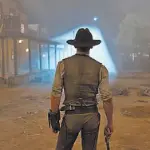It feels almost too on-the-nose to say Richard Linklater’s Boyhood felt like watching my own life unfold, but there’s no more accurate way to describe the profound sense of recognition that washed over me, not in a sudden jolt, but as a slow, creeping tide throughout its near three-hour runtime. This wasn’t the “shell-shocked” awe of a visceral action piece; it was something far more intimate, a cinematic déjà vu that left me feeling uniquely.
Linklater, in a feat of filmmaking patience that still boggles my mind, begins with a cherubic six-year-old Mason Evans Jr. From that point, for twelve real-life years, he revisits his cast, capturing vignettes of Mason growing up, his family evolving, life simply happening. Tonally, the film maintains a gentle, observational hum – a stark contrast to the high-octane narratives I usually gravitate towards. And yet, this quietude, this commitment to the mundane, became its most radical and, for me, its most resonant quality. It was in the small, seemingly inconsequential moments – a bike ride with a new friend in a new town, an awkward teenage conversation about girls, a strained family dinner post-divorce – that the film truly burrowed its way into my own memories.

Of the many things Boyhood gets profoundly right, chief among them is its depiction of the subtle, often confusing, currents of growing up. So many films about youth either romanticize it into a sun-drenched montage or dramatize it with singular, life-altering events. Boyhood dared to suggest that life is often a series of small shifts, unannounced changes, and gradual realizations. Watching Mason navigate the choppy waters of his parents’ separation, his mother’s subsequent relationships, the moves, the new schools – it wasn’t a highlight reel. It was the connective tissue, the everyday stuff that actually shapes you. There was no grand epiphany for Mason, just as there rarely is in real life. Instead, there were accumulated experiences, fleeting interactions, and the slow accretion of self. And in that, I saw my own haphazard journey, my own collection of disjointed memories that somehow coalesced into the person I am.
This is where Boyhood truly staked its claim on my soul. In a world saturated with extraordinary narratives, here was a film that celebrated the ordinary, the imperfect, the deeply normal. The anxieties Mason felt about fitting in, his early artistic inclinations, his evolving relationship with his sister Samantha – these weren't just plot points; they were reflections of a universal, yet deeply personal, experience. I didn't just watch Mason; I felt an echo of my own teenage uncertainties, my own sibling dynamics, my own clumsy attempts to define myself against the backdrop of an ever-changing family landscape. The film didn't need to tell me about the bonds of family or the pangs of adolescence; it showed them, in all their unvarnished, sometimes awkward, glory.

Another thing I appreciate is how un-sensationalized its presentation of life is. Linklater and his actors – particularly Ellar Coltrane, Patricia Arquette, and Ethan Hawke, who deliver performances of astonishing naturalism – resist the urge to manufacture drama. Arguments feel real, moments of connection are understated, and even the "big" life events, like going off to college, are treated with a sense of quiet continuity rather than climactic fanfare. Sure, some might argue it lacks a conventional plot, that it’s just “things happening”. But that's precisely the point, and its power. Life isn’t always a three-act structure. Sometimes, it’s just the flow.

If I had to single out one feature of Boyhood that audiences need to embrace, it's this commitment to the unadorned truth of an average existence. It requires a willingness to sit with characters, to observe rather than merely consume. But if you can sync with its gentle rhythm, you’ll find yourself not just watching a story, but experiencing something akin to a shared memory.

Boyhood will likely be remembered for its audacious production, but for me, its legacy is more personal. It didn’t just entertain me; it validated a swathe of my own quiet, unremarkable experiences, making them feel part of a larger, shared human tapestry. I felt seen, not by an audience, but by the film itself, as if it held up a mirror and said, “Yes, this too is life. This too is important”. And that feeling, that quiet affirmation, is something I’ll carry with me for a long, long time.
If this journey through Boyhood resonated with your own personal soundtrack 🎶, or if you felt that warm pang of "hey, I've been there too!" 🙋♂️🙋♀️, let me know! Gift me YOUR LIGHT ✨ and a generous LIKE 👍. It would totally make my day!
If you're interested in learning more about this world where films touch our emotions and provoke our thoughts, check out my profile. There are more stories that delve into that magic, that bond between our souls and the screen. It all comes down to pure movie passion. ❤️🔥✍️
Let's hit FOLLOW ➕ to keep finding these cinematic treasures together! 🚀🌟






























































View replies 0